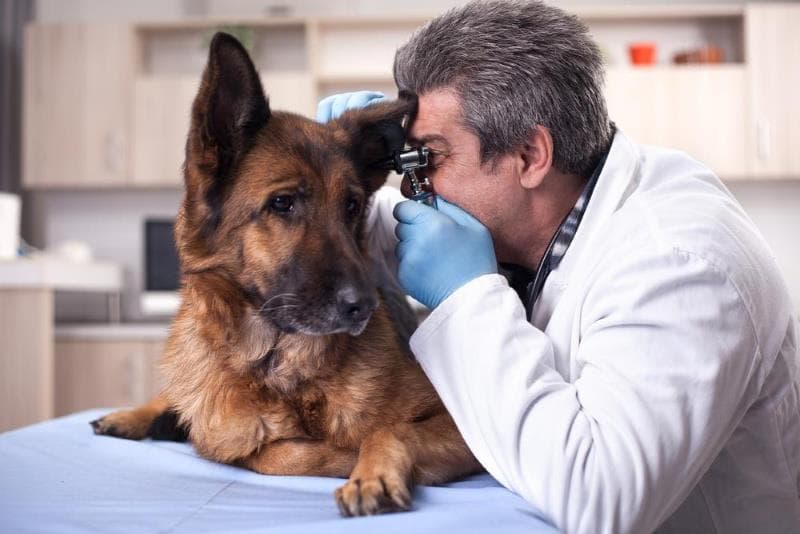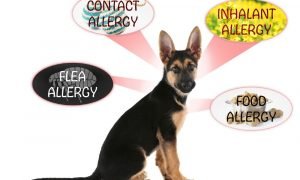The sun is shining, the weather is warm, birds are out chirping, and new plants and flowers are bursting to life and so are dog allergies.
Spring brings blooming plants, grasses, flowers, and all the symptoms of hay fever.
Allergens that cause seasonal spring allergies in humans can cause discomfort and trigger allergic reactions in our canine companions.
Airborne and inhaled allergies are items in the environment that cause your dog’s immune system to react, releasing antibodies containing serotonin, histamines, and leukotrienes.
Pollens from trees, grasses, ragweed, molds, and dust mites can cause your dog substantial discomfort.
The best clue to diagnosing seasonal allergies is timing.
Dogs, like humans, often show symptoms around the same time every year, usually when the seasons change.
Allergy symptoms appear in dogs between six months and four years of age, can be an inherited predisposition, and tend to become more severe with age.
If allergies are left untreated, your dog, in an attempt to relieve themselves, may create sores (hot spots) that can become a secondary infection.
12 Indicators of Dog Allergies
- Constant biting
- Constant licking – flank, groin, paws, and armpit regions
- Constant scratching – flank area and ears
- Red or irritated ear flaps – warm or hot to the touch
- Smelly ears
- Head shaking
- Itchy flaky skin
- Hair loss
- Rubbing of face
- Watery eyes
- Runny nose
- Sneezing
Immediate relief for itchy skin can be accomplished with a cool bath of your dog’s entire body using the following:
- Colloidal Oatmeal or Oatmeal dog shampoo
- Aloe Vera
- Eucalyptus
- Medicated Shampoo
Try to leave the treatment or shampoo on for 10 minutes and then rinse thoroughly.
Remember, merely washing the offending allergens off of your dog is often a great first line of defense, but this will only provide your dog temporary relief and will need to be repeated frequently.
Omega 3 and Omega 6 fatty acids are natural anti-inflammatory agents which have proven successful in approximately 20% of dogs tested.
Omega 3 fatty acids are found in coconut oil and fish oils such as Cod.
If you need immediate relief, the downfall of fatty acid supplementation is that it may take months to get into your dog’s system and be effective.
Over-the-counter antihistamines for humans (like Benadryl) have proven effective in dogs with seasonal allergies. A generic store brand version of Benadryl is fine.
Dosage is one milligram per pound. If one tablet is 25 milligrams and you have an 80 lb. dog, three tablets would equal 75 milligrams. Always dose on the low side to see how your dog reacts.
A common side effect caused by antihistamines is drowsiness. Another side effect is dry mouth, and some dogs experience hyper activeness instead of becoming sedated.
If you are interested in a more homeopathic approach, here are a few solutions for seasonal dog allergies:
Bragg’s Apple Cider Vinegar – apple cider vinegar can be used as a rinse after bathing your dog. Use 1 cup of apple cider vinegar per 2 to 4 cups of water.
Apply apple cider vinegar directly to dry and irritated skin and paws using a spray bottle. Fill your spray bottle with half water and half apple cider vinegar. Avoid open wounds because the acidity in the apple cider vinegar will sting.
Calendula ointment – calendula ointment can help relieve the itch. Apply a thin coat twice daily to affected areas.
Organic Coconut Oil – Organic coconut oil can be administered orally in food but can also be applied topically to relieve dry, flakey, and itchy skin.
Xiao Feng San – a common Chinese herbal combination useful for atopic dermatitis (allergy to inhalants). The dose is 1/8 of a teaspoon per 10 lbs. of body weight daily. Unfortunately, it’s not that common and easy to come by. Holistic practitioners and holistic websites are where to find help with Chinese herbs.
When Dog Allergies Need A Vet Appointment
- If home remedies are not working or helping
- If your dog has red, inflamed, warm, smelly, or “dirty” ears, you need to make an appointment with your vet. Your dog’s ears will likely need to be flushed and medications administered.
- If your dog has created a hot spot from constant licking, chewing, or biting. This is a self-inflicted open wound that could become infected. Make an appointment with your vet asap.
If your dog has severe allergies, your veterinarian may recommend allergy vaccines, oral or topical steroids, oral cyclosporine, or Apoquel.
A regular treatment plan cannot begin until an allergy is diagnosed. Careful observations and a planned trip to your veterinarian are the first steps in helping your dog survive allergy season.
Unfortunately, you can’t prevent your dog from having seasonal allergies but, you can keep their discomfort to a minimum.
Get your dog’s seasonal allergies under control, and take your tail-wagging friend outdoors to play and enjoy the warm spring weather!


























